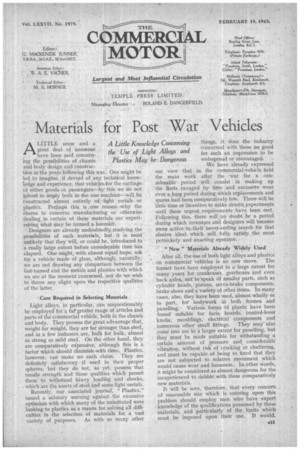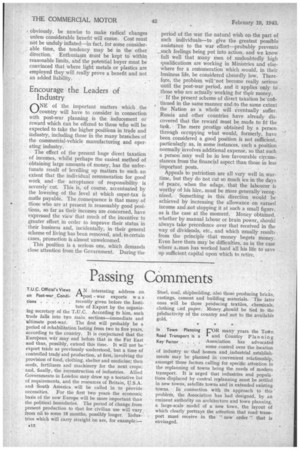Materials for Post War Vehicles
Page 13

Page 14

If you've noticed an error in this article please click here to report it so we can fix it.
ALITTLE sense and a great deal of. nonsense have been said concerning the possibilities of chassis and body design and construction in the years following this war. One might be led, to imagine, if devoid of any technical knowledge and experience, that vehicles:for the carriage of either goods or, passengers—by this we do not intend to imply both in the one machine—will be constructed almost entirely of -light metals or plastics. Perhaps this is one reason -why the shares in concerns manufacturing of otherwise dealing in certain of these materials are experiencing what May be termed a boomlet.
Designers are already undoubtedly studying the pOssibilities of such materiels, but it is most unlikely that they will, or could be, introduced to a really large extent before considerable time has elapsed. One might, with almost equal hope, ask for a vehicle made of glass, although, naturally, we are not drawing any comparison between the last-named and the metals and plastics with which we are at the moment concerned, nor do we wish to throw any slight upon the respective qualities of the latter.
Care Required in Selecting Materials Light alloys, in particular, can unquestionably be employed for :a fat' greater range of articles and parts of the commercial vehicle, both in the chassis and body. They possess the great advantage that, weight for weight, they are far stronger than steel, and in a few instances are, bulk for bulk, almost as strong as mild steel. On the other hand, they are comparatively eipensive, although this is a factor which should diminish with time. Plastics, however, can make no such claim. They are definitely satisfactory if used in their proper spheres, but they do not, as yet, possess that tensile strength and those qualities whiCh permit them to withstand heavy loading and shocks, . which are the assets of steel and some light metals.
Recently, our associated journal, "Plastics." issued a salutary warning against the excessive optimism with which many of the uninitiated were looking 'to plastics as a means for -solving all difficulties in the selection of materials for a vast variety of purposes. As with so many other things, it does the industry concerned with these no good for such an impression to be widespread or encouraged.
We have already expressed our view that in: the commercial-vehicle field the main work after the 'war for a con siderable period consist in making up the fleets ravaged by time and excessive wear over along period during which replacements and spares had been comparatively few. There will be little time or incentive to make drastic _experiments until these urgent requirements have been :met. Following this, there will no doubt, be a period during which inventors and designers will become more active in: their never-ending search for that elusive ideal which will fully satisfy the most pernickety and exacting operator.
"New" Materials Already Widely Used After all, the use of both light alloys and plastics on commercial vehicles is no new move. The former have been employed to a large extent for many years for crankcases, gearboxes 'and even back axles, not to'speak of smaller parts, such as cylinder heads,' pistons, servo-brake components, brake shoes and a variety of other items. In many cases, also, they have been used, almost wholly or in: part, for bodywork in both frames and panelling. Various forms of plastic have been found suitable for facia boards, control-lever knobs, mouldings, electrical components and numerous other small fittings. They may' also come into use to a larger extent for panelling, but they must be made suitable for withstanding a certain amount of pressure and considerable vibration, without risk of cracking or chattering, and must be capable of being so fixed that they are not subjected to relative movement which would cause wear and looseness. In otherWords, it might be considered as almost dangerous for the inexperienced to dabble' with these comparatively new materials.
It will be seen, therefore, that every concern of reasonable size which is entering upon this problem should employ men who have expert knowledge of the qualifications possessed by these materials, and particularly of the limits which must be imposed upon their use. It would, obviously, be unwise to make radical changes unless considerable benefit will ensue. Cost must not be unduly inflated—in fact, for some considerable time, the tendency may be in the other direction. Enthusiasm must be kept to within reasonable limits, and the potential buyer must be convinced that where light metals or plastics are employed they will really prove a benefit and not an added liability.
Encourage the Leaders of Industry
ONE of the important matters which the conntry will have to consider in connection with post-war planning is the inducement or reward which can be offered to those who will be expected to take the higher positions in trade and industry, including those in the many branches of the commercial-vehicle manufacturing and operating industry.
The effect of the present huge direct taxation of incomes, whirst perhaps the easiest method of obtaining large amounts of money, has the unfortunate result of levelling up matters to such an extent that the individual remuneration for good work and the acceptance of responsibility is severely cut. This is, of course, accentuated by the lowering of the level at which super-tax is malle payable. Theconsequence is that many of those who are at present in reasonably good positions, so far as their incomes are concerned, have expressed the view that much of the incentive to greater effort in order to improve their status in 'their business and, incidentally, in their general scheme 'of living has been removed, and, in certain cases, promotion is almost unwelcomed.
This position is a serious one, which demands close attention from the Government. During the period of the war the natural wish on the part of such individuals—to give the greatest possible assistance to the war effort—probably prevents _such feelings being put into action,•and we know full well that many men of undoubtedly high qualifications are working in Ministries and elsewhere for a rerimneration which would, in their business life, be considered absurdly low. Therefore, the problem will-not become really serious until the post-war period, and it applies only to' those who are actually working for their money.
• If the present scheme of direct taxation be 'eatinned in the same manner and ;to the same extent the Nation as a whole will eventually suffer. Russia and other countries have already discovered that the reward must be made to fit the task. The mere prestige obtained by a person through occupying what would, formerly, have been considered a good position is not sufficient, particularly as, in some instances, such a position normally involves additional expense, so that such a person 'may well be in less favourable circumstances from the financial aspect than those in less • important posts.
Appeals to patriotism are all very well in wartime, but they do not cut so much ice in the days • of peace, when the adage, that the labourer is worthy of his hire, must be more generally recognized. Something in this direction would be achieved by increasing the allowance on earned income and not stopping it at such a small figure, as is the case at the moment. Money obtained, whether by manual labour or brain power, should always take precedence over that received in tile way of dividends, etc., and which usually results from the principle 'that -money begets money. Even here there may be difficulties, as in the case where a,man has worked hard all his life to save up sufficient capital upon which to retire.




















































